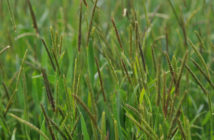The benefits of adding sulphur to a spring nutrition programme shouldn’t be forgotten as growers seek to improve nitrogen efficacy for applications in the coming months.
Farmers may have prioritised securing a supply of straight nitrogen when prices began to rise, but there is still the opportunity to incorporate sulphur into a fertiliser programme to add valuable nutrition to this year’s crops.
“Sulphur is an essential nutrient that is key for protein formation and has a direct influence on improving crop quality,” says Tom Oates, nutrition agronomist at Origin Fertilisers.
“Crops with high nitrogen input tend to have increased sulphur requirements as sulphur helps plants use nitrogen more effectively. For most cereals and grass, farmers should be looking to apply 12kg of N to 1kg of S to maximise nitrogen uptake and crop performance, and 6kg of N to 1kg of S for OSR and other brassicas.”
For those who have not yet purchased sufficient supplies of sulphur to support crop growth, Polysulphate could be a versatile and valuable source as it contains no additional nitrogen.
With the analysis 48%SO3, 14% K20, 17%CaO, 6%MgO, it could provide crops with their entire sulphur requirement. Since the sulphur in Polysulphate has a prolonged release pattern, growers can apply the product in early spring without the need to ‘top up’ later in the season, as Mr Oates explains.
Released over 5 days
“The sulphur in straight ammonium sulphate is released over five days so is vulnerable to leaching if there is heavy rainfall following application, particularly on sandy soil. Whereas the sulphur in Polysulphate is released over 55 days and so there is a much lower leaching risk, and more sulphur is likely to be taken up by the crop.
“An early application of 100kg/ha of Polysulphate would supply around 48kg of sulphur (as SO3) to the growing crop over the course of the season, enough for most cereal crops according to RB209. Average sulphur applications tend to be at the upper end of RB209 recommendations or higher, and growers will see benefits of applying extra sulphur to the crop.
“It also supplies a small amount of readily available potassium which is useful if farmers have cut back on their usual autumn applications. Small quantities of calcium and magnesium are also included in Polysulphate,” he concludes.
Polysulphate is mined in the UK and is certified for organic use and suitable for chloride sensitive crops.
| Crop | Sulphur requirement |
| Cereals | 25-50kg SO3/ha |
| OSR | 50-75kg SO3/ha |
| Legumes & sugar beet | 25kg SO3/ha |
| Silage | 40kg SO3/ha before every cut |
*Example of crop requirements according to RB209




